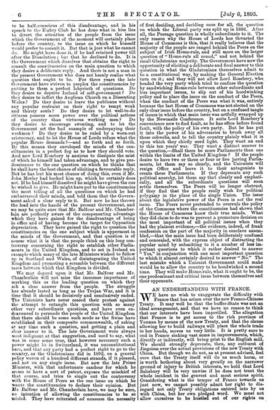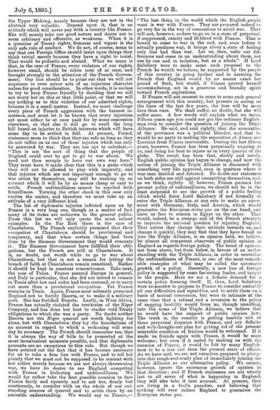AN UNDERSTANDING WITH FRANCE.
WE have no wish to exaggerate the difficulty with France that has arisen over the new Franco-Chinese Treaty. It may well be that the buffer-State was not an ideal arrangement, and that we have no reason to think that our interests have been imperilled. The allegation that France is to get access to the rich province of Yunnan by means of the new Treaty, and that the clause allowing her to build railways will place the whole trade in her hands, moves us very little. It is pretty sure to end in France sinking vast sums in improvements, which, directly or indirectly, will bring grist to the English mill. We should strongly deprecate, then, any outburst of Jingoism over the actual provisions of the new Treaty with China. But though we do not, as at present advised, feel sure that the Treaty itself will do us much harm, or is worth bothering about very greatly on the narrower ground of injury to British interests, we hold that Lord Salisbury will be very unwise if he does not treat the whole incident in the gravest and most serious spirit. Considering what is the temper of France towards us just now, we ca of possibly admit her right to dis- regard not only Treaty obligations entered into by us with China, but her own pledged word. We must not allow ourselves to be hustled out of our rights on 'the Upper Mekong, merely because they are not in the abstract very valuable. Depend upon it, that is an attitude which will never pay with a country like France. She will merely take our good nature and desire not to seem arbitrary and offensive, as weakness. When it is a question of Treaty rights, firmness and vigour is the only safe rule of conduct. We do not, of course, mean to say that our Foreign Office should insist upon things they think trivial merely because they have a right io insist. That would be pedantic and absurd. What we mean is that, in the case of France, every violation of our rights, however small, should be taken note of at once, and brought strongly to the attention of the French Govern- ment. Our line should be to point out that we will not acquiesce in even minor acts of an injurious character unless for good consideration. In other -words, it is useless to try to keep France friendly by deciding that we will not worry her on this or that little point, or that we will say nothing as to this violation of our admitted rights, because it is a small matter. Instead, we must challenge every piece of French aggression with the keenest in- sistence, and must let it be known that every injurious act must either be at once paid for by some concession elsewhere, or that else it will go to swell the long bill based on injuries to British interests which will have some day to be settled in full. At present, French statesmen seem to think that they are safe as long as they do not inflict on us one of those injuries 'which can only be answered by war. They are too apt to calculate,- " This is not the sort of thing that the people of England could ever be got to go to war about. We need not then scruple to have our own way here." They must have it made clear that this is a game which they will not be allowed to play with impunity, and that injuries which are not important enough to go to war about by themselves, may still be running up an account which it will be by no means cheap or easy to settle. French unfriendliness cannot be repelled with friendliness. Turning the other cheek in this case only excites the smiter, and therefore we must take up an attitude of a very different kind. The list of diplomatic injuries inflicted upon us by France is a very long one, though as a matter of fact many of its items are unknown to the general public. From this list we will only quote the most salient examples. In the Far East there is the case of Chantaboon. The French explicitly promised that their occupation of Chantaboon should be provisional and temporary, and that when certain things had been done by the Siamese Government they would evacuate it. The Siamese Government have fulfilled their obli- gations, but the French are still at Chantaboon. It is, no doubt, not worth while to go to war about Chantaboon, but that is not a reason for letting the breach of faith at Chantaboon remain unnoticed. Rather it should be kept in constant remembrance. Take next, the case of Tunis. France assured Europe in general, and Italy in particular, that she did not intend to remain in Tunis after law and order had been restored, or to e,arry, out more than a pro-visional occupation. Yet France remains in Tunis. Again, France most solemnly promised England not to fortify Biserta, or to make it a military port. She has fortified Biserta. Lastly, in West Africa, France has actually violated the territories of the Niger Company, and has done her best to render void Treaty obligations to which she was a party. No doubt neither Biserta nor the Niger quarrel are worth fighting for alone, but with Chantaboon they lay the foundations of an account in regard to which a reckoning will some day be necessary. The French should remember too, that it is always the way of bills to be presented at the most inconvenient moments possible, and that diplomatic accounts are no exceptions to this rule. But though we have pointed out the fact that it has become necessary for us to take a firm line with France, and to tell her plainly that we must not be supposed to be content with her action merely because we are not always threatening war, we have no desire -to see England competing with France in bickering and unfriendliness. We would far rather take the first possible occasion to face France fairly and squarely and to ask her, firmly but courteously, to consider with us the whole of • our out- standing sources of quarrel and to settle them by an amicable understanding.- -We would -say to France,= "The last thing in the world which the English people want is war with -France. They are prepared. indeed to go very far in the way of concessions to avoid war. They will not, however, endure to go on in a state of perpetual, if suppressed, enmity and ill-blood with France. That is bound to come to war in the end, and, even before it actually produces war, it brings about a state of feeling only less bad than war. Let us, then, table our dif- ferences and come to an understanding about them, not one by one and in isolation, but as a whole." If Lord Salisbury were to make some such proposal to the French he would, we believe, be supported by the people of this country in going further and in assuring the French that England would by no means exact her pound of flesh, but would, if France proved herself accommodating, act in a generous and friendly spirit toward French aspirations.
If France will not consent to come to some such general arrangement with this country, but persists in acting on the lines of the last few years, the loss will be more hers than ours. We shall suffer, no doubt, but she will suffer more. A few words will explain what we mean. Fifteen years ago you could not get the ordinary English- man even to consider the question of joining the Triple Alliance. He said, and said rightly, that the annexation of the provinces was a political blunder, and that he would be no party to making the separation of Alsace and Lorraine from France irrevocable. During the last fifteen years, however, France has been perpetually nagging at us, and doing her best to injure us in every quarter of the globe. The result has been that, slowly and surely, English public opinion has begun to change, and now the notion of joining the Triple Alliance is discussed with something very like approval, even in quarters where it was once derided and detested. No doubt our statesmen on both sides are still against committing themselves, and, as we think, rightly. If, however, France pursues her present policy of unfriendliness, we should not be in the least surprised to see the growth of a public feeling which would force Lord Salisbury if not formally to enter the Triple Alliance, at any rate to make an agree- ment with Germany, Italy, and Austria, which would guarantee the European status quo on the one hand, and leave us free to remain in Egypt on the other. That would, indeed, be a strange end of the French attempts to improve the national position by injuring England. That unless they change their attitude towards us, and change it quickly, they may find that they have forced us into the Triple Alliance, is an opinion held, we believe, by almost all competent observers of public opinion in England as regards foreign policy. The trend of opinion, not from above, but from below, in favour of an under- standing with the Triple Alliance, in order to neutralise the unfriendliness of France, is one of the most remark- able examples of what may be called the automatic growth of a policy. Generally, a new line of foreign policy is suggested by some far-seeing leader, and taught to the people. Here we see a definite demand for a certain policy forming itself. If, then, Lord Salisbury were to-morrow to propose to France to consider amicably all our difficulties and squabbles, and to settle them on a basis of mutual concession, but were to intimate at the same time that a refusal and a reversion to the policy of nagging hostility would force us, though unwilling, into the arms of the Triple Alliance, we believe that he would have the support of public opinion here. The truth is, the country is getting heartily sick of these perpetual disputes with France, and any definite and well-thought-out plan for getting rid of the present miserable condition of friction would be welcomed. If it made us friends again with France, it would be most welcome ; but even if it ended by ranking us with the enemies of France, it would be felt by many English- men to be a less evil than the present state of affairs. As we have said, we are not ourselves prepared to plung.: into this rough-and-ready plan of immediately joining the Triple Alliance as our alternative policy. We cannot, however, ignore, the enormous growth of opinion in that direction ; and if French statesmen are not utterly lost to all sense of what is happening in England, they will also take it into account. At present, they are living in a fool's paradise, and believing that nothing will ever induce England to guarantee the European status quo.









































 Previous page
Previous page